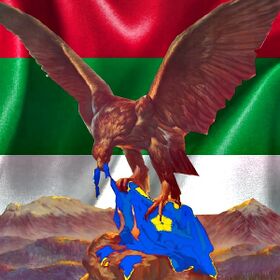Santiago-Mansean Conflict
This article or section marked as work-in-progress has not been edited in over seven days, but further work is required. Please notify the user who first added this template. |
| Santiago-Mansean Conflict | |||||||
|---|---|---|---|---|---|---|---|
 Ebenthali anti-Mansean propaganda poster | |||||||
| |||||||
| Belligerents | |||||||
|
Conference of Santiago: Support: |
Simulationists: Kingdom of Bulgaria Principality of Belo Horizonte Kingdom of Piratini | ||||||
| Commanders and leaders | |||||||
|
|
Gianfrank Mozer Patrick Hiran | ||||||
The Santiago-Mansean Conflict (Portuguese: Conflito Santiago-Manseano) was a major political, diplomatic and at a lesser extent, military,[c] conflict between the Conference of Santiago (CS) and the Kingdom of Manso, aided by micronational and simulationist allies from the II Lusophone Microcon which later formed the Queluz Group. The conflict was effectively started by The Manso on 13 April 2020, six days after the publication of the Treaty of Santiago which established the homonymous conference in the context of the division between the secessionist Brazilian sector and the mostly-simulationist Lusophone sector.
Uninvited to be part of the Conference and accusing representatives of the original member states of that organization of acting behind their back after they refused to ratify the Treaty of Persenburg, the Mansean Government allied itself with other micronations that maintained relations with simulationists, and the simulationists themselves, initiating a campaign of personal attacks and defamation against the Conference of Santiago, its member states and the micronationalists involved in it. The conflict unfolded in a series of occasional mutual, coordinated and isolated attacks as well as political and cyberwarfare campaigns. As a result, the conflict developed into cold war, with a constant tension between the micronations and simulations involved, rarely broken by more serious events.
The conflict came to a definitive end on 22 November 2022, following a diplomatic crisis that resulted in Vishwamitra's withdrawal from the Conference, and its temporary alliance with Manso, who launched a last offensive political smear campaign against the the three leading powers of the Conference. However, after failing to gather support among their diplomatic circle in their offensive against the CS, Manso withdrew and his Queen supposedly announced that she would cease active micronationalism. The conflict was never formally ended, but all parties refrained from taking further actions. From the beggining, the Santiago-Mansean Conflict led to the exponential growth of secessionism among Brazilian micronationalists, in contrast to the rapid decline of simulationism, and contributed to the solidification of the Brazilian sector and the Conference of Santiago and to the further diplomatic isolation of the Lusophone sector.
History
Background
Start of hostilities
Summit Crisis
The major diplomatic conflict that ignited the Santiago-Mansean Conflict, a series of hostilities exchanged between the Conference of Santiago and the Kingdom of Manso and its micronational and simulationist allies. The Summit Crisis, as shortened, took place at the I Santiago-Mansean Summit on which the Mansean Government hosted representants of the Ebenthal, Sildavia, the Lateran State and the Kingdom of Bauru and St. Vincent, and convened when Arthur II of Ebenthal offered to resolve doubts and mediate the conflicting tension that arose in Manso with the creation of the Conference of Santiago. Marina I agreed to host a meeting with representatives of the Conference and invited the King of Bauru to join the event. During the course of a few hours, the then Minister of Foreign Affairs of Manso, Igor de Barros, as well as the Bauruan monarch, began to attack the personal dignity of the CS representatives, causing the Ebenthaler monarch to withdraw from the meeting, outraged, as much as the other derivatist micronationalists. The negative outcome of the summit started a long and serious diplomatic crisis between the member states of Brazilian origin of the Conference of Santiago and the Kingdom of Manso and its allies, called Queluz Group.
Burgundy Vengeance
The so called Operation Burgundy Vengeance, was a defensive cybernetic operation promoted by the United Provinces of Mauritia and supported by several member states of the Conference of Santiago, against the simulationist project known as "German Empire" and its allies micronationalists and simulationists that were part of the hybrid group called Queluz Group, in the simulationist-dominated Lusophone sector. The operation happened after Mauritia denounced his intentions to remain in the Lusophone sector, when the micronation of Burgundy were seized by the "German Empire", that also blamed Mauritia after their website went offline. Threatned by legal actions in macronational Brazilian Justice, the response of Mauritaanse-Brazilian derivatist were in cybernetic defense, denounce of the Queluz Group for their actions and the negotiations when were clear that no proof existed of Mauritaanse sabotage on "German Empire" website. The accusations soon were never again used and for a while, no attacks were made against Brazilian sector
Cold war
Xingu Affair
The conflict was motivated by Manso's aggressive diplomatic policy towards member states of the Conference of Santiago and it was pursued primarily through political actions, propaganda and espionage by both parts. On 18 April 2022, immediately after the official announcement of the conversion of the State of Xingu into a protectorate of Karnia-Ruthenia, the ruler of Manso demanded an explanation from the Grand Prince of the Xingu, urging him not to join the Conference of Santiago and Karnia-Ruthenia, accusing them of maintaining an aggressive foreign policy, and began to attack the Xingu monarch with insults when he proceeded with Xingu-Karno-Ruthenian relations. In retaliation, several attacks by Mansean allies were verified and a coalition of state members of the Conference of Santiago, headed by Arthur II of Ebenthal started a campaign of denounciation against the Kingdom of Manso and their aggressions, exposing them to the intermicronational community their side of the conflict with Manso that extends since 2020.